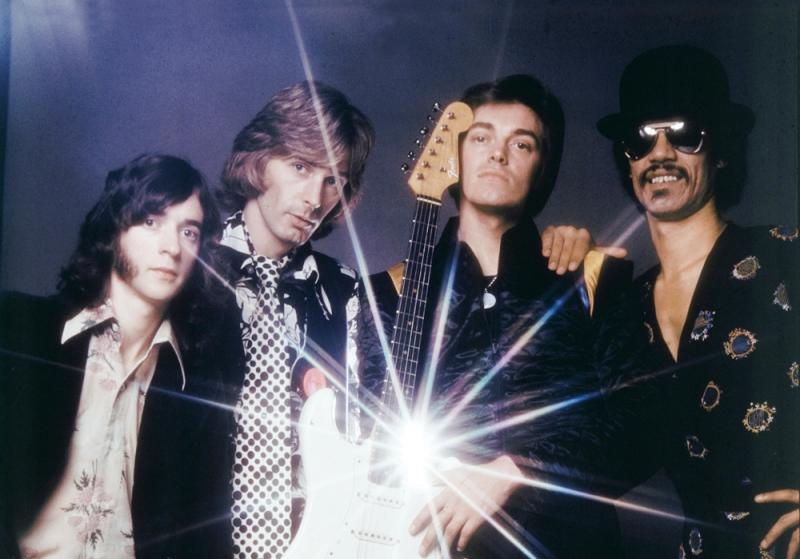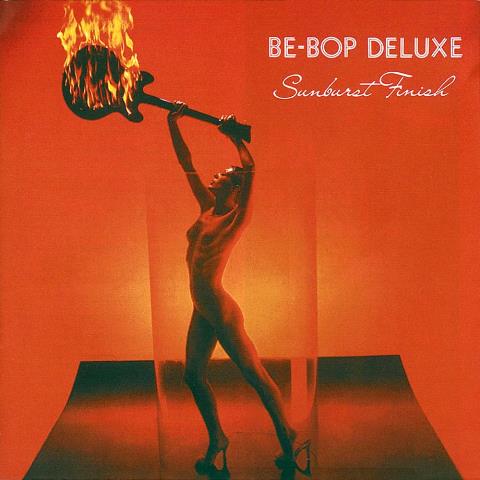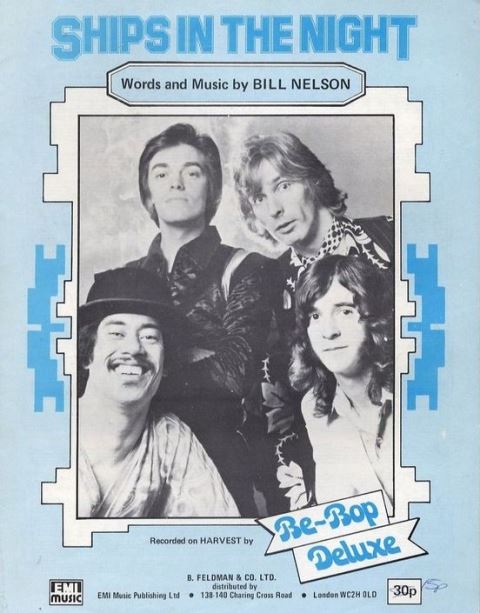Reissue CDs Weekly: Be-Bop Deluxe | reviews, news & interviews
Reissue CDs Weekly: Be-Bop Deluxe
Reissue CDs Weekly: Be-Bop Deluxe
Box-set edition of 1976’s ‘Sunburst Finish’ reveals Bill Nelson’s art-rockers as unexpectedly match-fit for punk

After Be-Bop Deluxe finished recording their third album at Abbey Road, their label said they needed something to promote as a single. EMI told band-leader Bill Nelson they wanted a song with commercial appeal. The result was the single “Ships in the Night”, which duly charted during the last week of February 1976.
In the book accompanying the new Deluxe Box Set Sunburst Finish, Nelson candidly says “I never really considered the band to be anything but an album band. I considered hit singles as belonging to the domain of ephemeral pop acts, rather than the currency of a serious rock band. I was, I guess, a bit dismissive of such things at the time. Nevertheless, I half-heartedly made an attempt to come up with something that might satisfy EMI’s request.” He admits to being unconvinced by “Ships in the Night” and being surprised by the hit. It’s, he says, “perhaps [his] least favourite Be-Bop Deluxe song.” Nonetheless, as Nelson recognises, it became his band’s calling card with a wider audience.
 EMI’s concerns about Be-Bop Deluxe’s commercial prospects course through the press release accompanying the album. Reproduced for the new reissue, it opens with the statement “If any one artist deserves to crash his way into the ranks of British rock heroes this year, then it is undeniably Bill Nelson.” Over five pages, it tells Nelson’s and the band’s story, declaring they are “preparing for the final onslaught which will undoubtedly see them out on top at last.” Implicitly, they been underachievers and if they did not end up “on top”, the word “final” suggests EMI would have reconsidered their relationship with Be-Bop Deluxe.
EMI’s concerns about Be-Bop Deluxe’s commercial prospects course through the press release accompanying the album. Reproduced for the new reissue, it opens with the statement “If any one artist deserves to crash his way into the ranks of British rock heroes this year, then it is undeniably Bill Nelson.” Over five pages, it tells Nelson’s and the band’s story, declaring they are “preparing for the final onslaught which will undoubtedly see them out on top at last.” Implicitly, they been underachievers and if they did not end up “on top”, the word “final” suggests EMI would have reconsidered their relationship with Be-Bop Deluxe.
Such toughness is endemic to paymasters wanting a return and neither EMI or Nelson knew that a band the label signed later in the year would change how “rock heroes” were defined. Doctors of Madness, the band supporting Be-Bop Deluxe on the Sunburst Finish tour, got a foretaste of this in May 1976 when the prime parameter shifters were billed with them in Middlesbrough. But when Sunburst Finish was issued in February, barely anyone realised that the Sex Pistols and punk rock would go on to define 1976.
Curiously, listening to Sunburst Finish now suggests that Be-Bop Deluxe were ready for the concise reconfiguration of rock that was to come. Nelson, as history shows, pushed through punk to split Be-Bop Deluxe in 1978, form the new wavey Red Noise, produce John Cooper Clarke and The Skids, and establish himself as a no-compromise solo artist along the Eno lines.
Though his former band's third album was a poppy take on prog-rock, the attack, energy and focus are compatible with some of the non-punk but marketed as almost-such bands which emerged during 1977: Advertising, say, and especially XTC – whose debut album White Music shares much of Be-Bop Deluxe’s nerviness and twitchiness. Sunburst Finish was co-produced by Nelson with, in his first credit as such, John Leckie. The latter went on to work with XTC on, indeed, White Music and its follow-up.
 Irrespective of the bolted-on “Ships in the Night”, Sunburst Finish is a model of precision. Its opening cut “Fair Exchange” features some brief Queen-ish piano flourishes, fiddly guitar and time signature shifts, but is taken at such a clip it could easily have been reconfigured as a single by new wavers The Invaders or America’s The Cars. Of course, much of the album is of its period. “Heavenly Homes”, which follows “Fair Exchange”, has a John Lennon-esque melody and could have been recorded at any point during the Seventies. The same applies to the dreamy “Crying to the Sky”, with its Hendrix-nodding guitar flurries and solo. Overall, the album is surprisingly fresh and melodic.
Irrespective of the bolted-on “Ships in the Night”, Sunburst Finish is a model of precision. Its opening cut “Fair Exchange” features some brief Queen-ish piano flourishes, fiddly guitar and time signature shifts, but is taken at such a clip it could easily have been reconfigured as a single by new wavers The Invaders or America’s The Cars. Of course, much of the album is of its period. “Heavenly Homes”, which follows “Fair Exchange”, has a John Lennon-esque melody and could have been recorded at any point during the Seventies. The same applies to the dreamy “Crying to the Sky”, with its Hendrix-nodding guitar flurries and solo. Overall, the album is surprisingly fresh and melodic.
Fans will know this already and the new slipcase-housed, four-disc box edition is firmly aimed at the converted. As well as the book, the case contains the four discs in a fold-out wallet and reproductions of period memorabilia: the illuminating EMI press release, the programme from the tour with Doctors of Madness (who would also work with Leckie), four band portrait photos and a poster. Disc One collects the album and the single version of “Ships in the Night”. Disc Two is a new remix of Sunburst Finish, which sounds more spacious than the 1976 original. Some buyers might find such messing with the past unnecessary. Supplementary tracks on the disc are alternate and early versions of album cuts, and an untitled demo. Disc Three collects a cracking, crackling January 1976 BBC live concert and a February 1976 Peel session, while the final disc is a DVD with a new surround-sound mix of the album, the new remix, the promo video for “Ships in the Night” and an lively January 1976 Old Grey Whistle Test appearance.
A couple of hiccups niggle. The recording details for the six previously unreleased tracks on Disc Two are not given so it is not known how they relate to the album, and the essay following Nelson’s needlessly repeats information which he has already recounted. And, depending on personal sensibilities, the gratuitous naked-woman album sleeve is as naff now as it was then. Manifestly though this is ne plus ultra take on Sunburst Finish, an album which has worn unexpectedly well.
- Next Week: Unusual Sounds, a compilation purportedly telling “The Hidden History of Library Music”
- Read more reissue reviews on theartsdesk
Explore topics
Share this article
The future of Arts Journalism
You can stop theartsdesk.com closing!
We urgently need financing to survive. Our fundraising drive has thus far raised £49,000 but we need to reach £100,000 or we will be forced to close. Please contribute here: https://gofund.me/c3f6033d
And if you can forward this information to anyone who might assist, we’d be grateful.

Subscribe to theartsdesk.com
Thank you for continuing to read our work on theartsdesk.com. For unlimited access to every article in its entirety, including our archive of more than 15,000 pieces, we're asking for £5 per month or £40 per year. We feel it's a very good deal, and hope you do too.
To take a subscription now simply click here.
And if you're looking for that extra gift for a friend or family member, why not treat them to a theartsdesk.com gift subscription?
more New music
 Album: Rise Against - Ricochet
Have the US punk veterans finally run out of road?
Album: Rise Against - Ricochet
Have the US punk veterans finally run out of road?
 Music Reissues Weekly: The Final Solution - Just Like Gold
Despite their idiotic name, these San Francisco psychedelic pioneers sounded astonishing
Music Reissues Weekly: The Final Solution - Just Like Gold
Despite their idiotic name, these San Francisco psychedelic pioneers sounded astonishing
 Mogwai / Lankum, South Facing Festival review - rich atmospheres in a south London field
Two polished performances and an embarrassment of instruments
Mogwai / Lankum, South Facing Festival review - rich atmospheres in a south London field
Two polished performances and an embarrassment of instruments
 Album: Alison Goldfrapp - Flux
The synth diva in her comfort zone - maybe getting a little too comfortable, though
Album: Alison Goldfrapp - Flux
The synth diva in her comfort zone - maybe getting a little too comfortable, though
 Album: The Black Keys - No Rain, No Flowers
Ohio rockers' 13th album improves on recent material, but still below mainstream peak
Album: The Black Keys - No Rain, No Flowers
Ohio rockers' 13th album improves on recent material, but still below mainstream peak
 Wilderness Festival 2025 review - seriously delirious escapism
A curated collision of highbrow hedonism, surreal silliness and soulful connection
Wilderness Festival 2025 review - seriously delirious escapism
A curated collision of highbrow hedonism, surreal silliness and soulful connection
 Album: Ethel Cain - Willoughby Tucker, I'll Always Love You
Relatively straightforward songs from the Southern Gothic star - with the emphasis on 'relatively'
Album: Ethel Cain - Willoughby Tucker, I'll Always Love You
Relatively straightforward songs from the Southern Gothic star - with the emphasis on 'relatively'
 Album: Black Honey - Soak
South Coast band return with another set of catchy, confident indie-rockin'
Album: Black Honey - Soak
South Coast band return with another set of catchy, confident indie-rockin'
 Album: Molly Tuttle - So Long Little Miss Sunshine
The US bluegrass queen makes a sally into Swift-tinted pop-country stylings
Album: Molly Tuttle - So Long Little Miss Sunshine
The US bluegrass queen makes a sally into Swift-tinted pop-country stylings
 Music Reissues Weekly: Chip Shop Pop - The Sound of Denmark Street 1970-1975
Saint Etienne's Bob Stanley digs into British studio pop from the early Seventies
Music Reissues Weekly: Chip Shop Pop - The Sound of Denmark Street 1970-1975
Saint Etienne's Bob Stanley digs into British studio pop from the early Seventies
 Album: Mansur Brown - Rihla
Jazz-prog scifi mind movies and personal discipline provide a... complex experience
Album: Mansur Brown - Rihla
Jazz-prog scifi mind movies and personal discipline provide a... complex experience
 Album: Reneé Rapp - Bite Me
Second album from a rising US star is a feast of varied, fruity, forthright pop
Album: Reneé Rapp - Bite Me
Second album from a rising US star is a feast of varied, fruity, forthright pop

Add comment